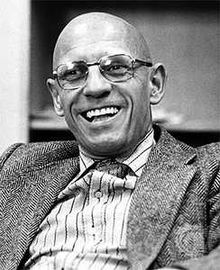Part of my argument in my research is the notion that social media is an institution. Enter French Philosopher Michel Foucault:
Cute lil guy don’t you think?
He elaborates on the idea of the panopticon… “A pan-o-what-a?!” you say? Before you question my research and start asking me whether I’ve seen a frying pan transform into some kind of Optimus Prime, I will expand. The panopticon originally stemmed from Jeremy Bentham – mostly from the behaviours of prison and the idea of surveillance. Foucault, furthers Bentham’s theory and in short, the idea behind the panopticon is about power, discipline, and regulation. Specifically, it is an omniscient quality that asserts an invisible power by ordering and structuring social regulation. As such, we at the individual level are ordered at a social level, which ultimately infiltrates into the regulation of our morals. A set of unspoken-but-agreed-upon rules that govern us into cordial, civil social subjects amongst each other.
An example of the theory of the panopticon could be the school setting. For the most part, we know that when the bell rings, we know to make our way to the classroom. But how do we know to do this? Yes, because it’s the rule. But we follow this rule by taking the social cue that everyone else is doing it too. We have a choice to be late, or not go. But, we also know there are consequences to those options because we are governed into knowing these possibilities. Hence, we are socially regulated to go to class when the bell rings, and morally regulated to go knowing the repercussions if we don’t ,or are tardy. Psychology lovers out there, I’m guessing you’ll compare this to the idea of classical conditioning. What I take from the panopticon, is the notion that we get autonomy by conducting ourselves in orderly fashion and creating a sense of cohesion, but also keeping us in check so that one person doesn’t get too carried away towards a free-for-all-every-man-for-himself idea.
As I tie this into my research, I am suggesting that social media serves as a panopticon. Social media as the institution, and us users are the police and watch-dogs of each other. As I creep someone’s profile, I am making judgements of what they post, how they look in their pictures, what they say, and so forth. Should they make a mistake (an honest misstep to a massive faux-pas) I might be inclined to step in to correct said action. Notice that there’s always someone who’s taking stealth photos of someone dressed highly inappropriately, ready to post on their page to comment, remark, laugh? Or felt the need to take a picture of someone who ticked you off somewhere in public, then share and vent to your online friends?
I debated this with my boyfriend the other day. He at first didn’t seem too concerned as his argument was that people will always make comments, remarks and criticisms. And yes, while we seem quick to judge and harp on someone over a forum or comments section, it is easier as we can hide behind the computer screen. I agreed, but then pointed out that while I have laughed at a friend’s Instagram post at a stranger’s expense, I also am uneasy with the idea that perchance there could be some photo of me online somewhere with derogatory and harsh captions because I shoved someone down the stairs (this NEVER happened!), when it was a circumstance of a very packed stairwell and I nudged past them. There’s always two sides to a story.
With the accessibility of the internet and social media, we all seem to feel the need to point these occurrences out online and call someone out on their action and criticize. To a point, we are asserting our power and discipline, and taking social regulation to a whole new level. But ever thought about the moral aspect of it? We are after all, violating someone’s privacy rights by taking their picture without their knowing.
Whether I care about your actions or not, I am at the end of the day, watching your every move.
